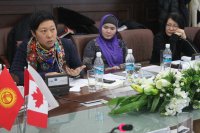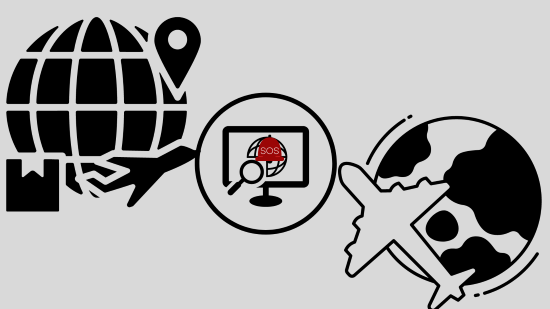20-09-2016, 00:00 Категория: English » News
 Media xenophobia has helped cause divisions in Kyrgyzstan. But
organisations such as the School of Peacemaking and Media Technology are
challenging those who seek to create tension.
Media xenophobia has helped cause divisions in Kyrgyzstan. But
organisations such as the School of Peacemaking and Media Technology are
challenging those who seek to create tension.
According to monitoring by the School of Peacemaking and Media Technology in Central Asia, a nonprofit organization based in Kyrgyzstan, hate speech is widely used in media, internet and public discourse. For example, in the last year more than one third of Kyrgyzstanis have heard, seen or read in the media statements expressing disapproval, hatred, or aggression towards minorities, which, according to the respondents, could lead to violence. Almost half of respondents felt "insecurity and fear of destabilization, fear for their life and fear of the future."
Despite some decline in nationalist rhetoric in media, our experts indicate the growing number of groups which are potential targets of hate speech and victims of hate speech crimes. Media sphere analysis for the last year has shown that, in addition to ethnic groups, the main targets of hate speech in Kyrgyzstan are religious and LGBT groups.
Last year the abusive attacks in media were mainly against ethnic groups. They were especially strong in 2010, when southern Kyrgyzstan faced ethnic violence between the Kyrgyz and Uzbeks that resulted in hundreds of dead and thousands of wounded. Back then, media and journalists were accused of inappropriate coverage of the issues and incitement of ethnic conflict.
Society has an opinion of the unrestrained freedom of expression which often leads to the transmission of violent statements in public discourse. Some journalists and speakers don’t understand the difference between freedom of expression and hate speech, and use stereotypes, clichés, ad hominem attack and dehumanising metaphors against minorities.
One of the reasons could be that Kyrgyzstan and its media sphere are the most free in Central Asia and outrank many states of the former Soviet Union. According to the World Press Freedom Index 2016, provided by Reporters Without Borders, an international journalistic organisation, the country ranks rather high.
Founded in 2010, the School of Peacemaking and Media Technology is the only organisation in Kyrgyzstan and Central Asia that started combating the spread of hate speech in media and on the internet.
Based on local experience and international cases, it has developed its programmes to reduce the potential for renewed ethnic conflict in the Kyrgyz Republic. As part of its work, regular media monitoring for hate speech has been established to study public opinion, and based on its results, innovative training materials are developed for journalists, editors, and activists to train them on how to overcome hate speech.
Approaches implemented by partner media NGOs in the Balkans and Southern Caucasus have been used to prepare workshops. For example, training reporters in Team Reporting, their joint work in multinational journalist teams for unbiased reporting have become a preventive measure to reduce tensions in the society. Specific discussions on removing stereotypes in reporting and among public speakers from conflict zones have been developed and organised to make them tolerant in their statements.
"After the training, we found it easy to work with material relevant to ethnic issues because we have the necessary skills and techniques to interact with ethnic groups," Ernist Nurmatov, editor-in-chief of Format.kg web portal based in Osh, said.
The Encouraging Diversity Through Media Program launched in 2014 helped journalists cover ethnic, linguistic and cultural diversity, overcome hate speech and develop a large online course, Diversity Reporting, which now covers 145 students.
Media monitoring also makes it possible to react quickly and unambiguously to manifestations of hatred and hate speech in statements made by public officials, and consistently document such actions.
"Hate speech studies have become a tool to protect the rights of minorities through monitoring and recording of hate speech incidents," Alina Amilaeva, regional assistant to anti-hate speech projects of School of Peacemaking, emphasised.
"Also we help local NGOs not only in Kyrgyzstan, but also in Central Asia, analyse rhetoric and its consequences upon request in order to settle conflicts between the perpetrators and victims of hate speech. Besides, we started covering issues relevant to religion and faith, which are sensitive now, and explaining to the media how not to stir up hostility."
The involvement of stakeholders into the combat against hate speech is another approach.
For field surveys and studies of hate speech impact on the society, the School of Peacemaking involves the staff of related NGOs that work on the issues of minorities. Some of them were the victims of hate speech from xenophobic groups. These help to generalise the findings in a more competent way and provide their own recommendations.
Activists say this approach is important. "As to the practical outcomes of these surveys, human rights defenders and activists use them in their work for better advocacy around vulnerable minorities by referring to the study that proves the use of hate speech against these groups," Alia Moldalieva, media coordinator of the Coalition for Justice and Non-Discrimination (Bishkek), said.

Состоялась онлайн конференция, на которой обсуждались риски транснациональных репрессий в работе активистов, медиаработников, юристов и…
Можете ли вы ответить на вопрос: что такое миротворческая журналистика или журналистика мира, как это принято говорить в международной практике?
Это – позитивная журналистика?
Это – смягчение конфликта за счет историй, где говорится о том, как власти решают проблему?
Или это – баланс фактов и мнений, построенных на беспристрастной хронологии освещаемого вами конфликта?
Ни один из трех предложенных вопросов не является миротворческой журналистикой, поскольку она строится на других принципах.
Смотрите видеоурок от Инги Сикорской, директора Школы миротворчества и медиатехнологий в ЦА, медиаэксперта, исследователя, журналистки.
Инга освещала разные конфликтные события, работала в Афганистане, написала ряд учебных пособий для журналистов и активистов, в том числе "Как женщине-журналисту делать визуальные репортажи из Афганистана",
"Как освещать многообразие и этнические конфликты,"Как журналистам избегать языка вражды в своих репортажах" и другие.
Инга проводит семинары по медиа, кризисным и миротворческим коммуникациям в Центральной Азии и других странах.
Смотрите видео-урок с примерами и пояснениями, а потом выполните упражнение.
![]() Группа независимого мониторинга,
экспертизы, анализа и образования Школы миротворчества и медиатехнологий в ЦА
оказывает услуги в НКО секторе, проводит консультации, экспертизу тренинги по
вопросам, связанным с медиасферой и публичным дискурсом.
Группа независимого мониторинга,
экспертизы, анализа и образования Школы миротворчества и медиатехнологий в ЦА
оказывает услуги в НКО секторе, проводит консультации, экспертизу тренинги по
вопросам, связанным с медиасферой и публичным дискурсом.
Мы проводим медиа-мониторинги, медиа-исследования, разрабатываем медиа-планы и стратегии, готовим медиа-аналитику по заданным тематикам, а также предлагаем следующие услуги:
·исследование медиа-сферы на основе мониторинга СМИ на предмет освещения по заданной тематике с использованием уникальной методики, анализ, выработка рекомендаций;
·полный медиа-мониторинг и анализ выделенных публикаций по различным индикаторам, в зависимости от задачи– сбор всех материалов об объекте мониторинга по максимально широкому списку с помощью специальных электронных систем мониторинга, ручного поиска и интеллектуальных инструментов для анализа (кыргызский, русский, английский языки);
·по ограниченному медиа-списку – поиск публикаций об объекте мониторинга по определенному списку СМИ (обычно наиболее авторитетные, популярные, значимые с точки зрения достижения ЦА, издания);
·аналитические обзоры по заданной тематике;
·разработка моделей информационно-просветительских кампаний( интеллектуальная логистика, исследование и анализ ситуации, планирование мероприятий, определение аудитории, стратегия, сбор информации, анализ, разработка послания, определение ожидаемых результатов, тестирование кампании, разработка публичных мероприятий, отслеживание результатов кампании);
·разработка медиа-планов, мониторинг и анализ медиа-активности, кризисный медиа-мониторинг, архивный/ретроспективный медиа-мониторинг;
·консультации по созданию медиа-кампаний;
·тренинговые/обучающие услуги, мастер-классы: разработка тематики и программы тренинга;
·проведение медиа-тренингов/мастер-классов;
·информационные услуги (создание релизов, адаптация пресс-релизов под веб-публикацию. линкование, ссылки, теги и т д);
·разработка сценария и создание видео- и аудио-интервью, тезисы;
·подготовка спикеров для пресс-конференций, разработка сценария пресс-конференции и брифингов, тезисы их выступления;
·разработка медиа-плана для участия, выступающего в тематических программах по социально-значимым вопросам;
·редактирование и обработка текстов (кыргызский, русский, английский языки).
Вышеперечисленные услуги осуществляются по договору оказания платных услуг в некоммерческом секторе и рассчитаны в соответствии с калькуляцией платных услуг на текущий год. За подробной информацией обращаться на peacemakingschool@gmail.com или написать сообщение на Фейсбук https://www.facebook.com/Alinapeacemaker